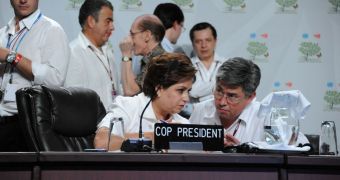After four years of negotiations, one would expect the the majority of world governments could come to an agreement on the issues plaguing our planet. Apparently, that is too much to hope for. The UN Climate Change Conference COP16, which took place in Cancun, ended with few results.
In all fairness, a modest deal has been reached among the 193 participating governments, but the agreement leaves sufficient avenues countries can take to avoid actually respecting their promises.
And, even if states agreed to cut emissions, they could not agree on the amount, which means that a temperature rise of more than 2 degrees Celsius is very likely to take place in the coming decade.
Such a decision cannot be explain of we hold that the people who made it knew what they were discussing. Otherwise, this blatant lack of interest for our planet, and ultimately our own, well-being is appalling.
All pledges to reduce emissions that various countries made were not dictated by a general goal, but by national interests, and this is why the temperatures will rise excessively in the coming years.
The new agreement, officials announced, is mostly designed to curb deforestation, promote low-carbon technology transfers to emerging economies, and establish a green fund by 2020, worth some $100 billion per year.
According to analysts at Climate Action Tracker, the current pledge levels see the world heading towards a 3.2 degree Celsius increase in global temperature, which spells disaster for some of the poorest nations on the face of the Earth.
“This is way better than what we were expecting only a few weeks ago. This is a significant turning point. It clearly says that there should be reductions from developing countries,” said Chris Huhne.
“It takes us forward to a legally binding overall outcome,” added the official, who is the UK Energy Secretary. His excited tone was totally out of tune with the general feeling of disappointment that swept through people actually interested in changing things for the better.
His position reminded everyone of US President Barack Obama's ludicrous statement last year, after the 2009 meeting in Denmark, when he said that a major step forward had been taken, when in fact that meeting produced only a hastily-written, non-legally-binding agreement, that has no effects.
“This is a hollow and false victory that was imposed without consensus, and its cost will be measured in human lives,” said at the meeting the Bolivian ambassador, Pablo Solon.
“They are thinking like politicians. The experts that know about climate change, they know that we are right,” he said upon hearing the cheers that followed the signing of the document.
“This agreement won’t stop temperature from rising by 4°C and we know that 4°C is unsustainable,” he added.
“Cancun may have saved the [UN] process but it did not yet save the climate,” concluded Greenpeace International Climate Policy Director Wendel Trio, quoted by Our World.
An overview of the main objectives of the Cancun Deal:
All countries to cut emissions
Forest deal to provide finance for countries who avoid emissions from deforestation
Finance deal to potentially provide $30 billion for developing countries to adapt to climate change now, and up to $100 billion later
A new UN climate fund to be run largely by developing countries
Easier transfer of low carbon technology and expertise to poor countries
China, the US and all major emitters to have actions inspected
Scientific review of progress after five years

 14 DAY TRIAL //
14 DAY TRIAL //